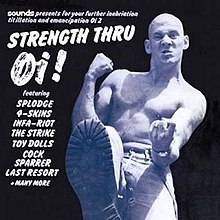Strength Thru Oi!
| Strength Thru Oi! | ||||
|---|---|---|---|---|
 | ||||
| Compilation album by various artists | ||||
| Released | May 1981 | |||
| Recorded | Various | |||
| Genre | Oi!, punk rock | |||
| Label | Decca | |||
| Various artists chronology | ||||
| ||||
Strength Thru Oi! is a 1981 Oi! compilation album, featuring various artists and released by Decca Records, released in collaboration with Sounds magazine.
The album was the sequel to Oi! The Album (1980), and itself was followed by Carry On Oi! (Oi 3!, 1981) and Oi! Oi! That's Yer Lot! (Oi/4, 1982).
Track listing
[edit]- "National Service" - Garry Johnson
- "1984" - 4 Skins
- "Gang Warfare" - The Strike
- "Riot Riot" - Infa-Riot
- "Dead End Yobs" - Garry Johnson
- "Working Class Kids" - The Last Resort
- "Blood on the Streets" - Criminal Class
- "She Goes to Fino's" - The Toy Dolls
- "Best Years of Our Lives" - Barney Rubble
- "Taken for a Ride" - Cock Sparrer
- "We Outnumber You" - Infa-Riot
- "The New Face of Rock'n'Roll" - Garry Johnson
- "Beans" - Barney Rubble
- "We're Pathetique" - Splodge
- "Sorry" - 4 Skins
- "Running Riot" - Cock Sparrer
- "Johnny Barden" - The Last Resort
- "Isubaleene (Part 2)" - Splodge
- "Running Away" - Criminal Class
- "Skinhead" - The Strike
- "Deidre's a Slag" - The Toy Dolls
- "Harbour Mafia Mantra" - The Shaven Heads
Controversy
[edit]When Strength Thru Oi! was released, it was controversial because its title was alleged to be a play on a Nazi slogan ("Strength Through Joy"), and the cover featured Nicky Crane, a British Movement activist who was serving a four-year sentence for racist violence. Rock critic Garry Bushell, who was responsible for compiling the album, said its title was a pun on The Skids' EP Strength Through Joy and that, as an active anti-fascist in the 1970s, he had been unaware of the Nazi connotations. He also denied knowing the identity of the skinhead on the album's cover until it was exposed by the Daily Mail two months later. The intended cover model was bodybuilder Carlton Leach but the pictures, taken at the Bridge House pub in Canning Town, East London, weren't good enough. A cover drawn up by the record label showing a young skinhead from above with the title on his head was rejected. The Crane image was taken from a Christmas card pinned to a wall in the Sounds office.[1]
Bushell later said: "I had a Christmas card on the wall, it had that image that was on the cover of Strength Thru Oi!, but washed out. I honestly, hand on my heart, thought it was a still from The Wanderers. It was only when the album came through for me to approve the artwork that I saw his tattoos. Of course, if I hadn't been impatient, I would have said, right, fucking scrap this, let's shoot something else entirely. Instead, we airbrushed the tattoos out. There were two mistakes there, both mine. Hands up."[2] The album was "hastily withdrawn" by Decca Records when Crane's identity and previous convictions were made public, and has since become very collectable.[3]
It was not so easy to deny the album cover's glorification of violence and the sinister tone of its sleeve notes: "A mass of boots, straights, and combat jackets, skins and boot boys, grins and hoots and oy-oy's, young blood on the prowl.... Getting nicked for wearing steel caps, a flick blade flashing in the moonlight." However, otherwise suggested that this was meant to reflect the reality of the lives of the British working class, as opposed to glorifying the violence faced by them.[4]
See also
[edit]References
[edit]- ^ Sedazzari, Matteo. "Garry Bushell Speaks Out" Zani.co.uk.
- ^ Petridis, Alexis (March 19, 2010). "Misunderstood or hateful? Oi!'s rise and fall". The Guardian. London. p. 6. Retrieved December 5, 2013.
- ^ Chambers, Pete (July 3, 2007). "Nostalgia: The good guys with the Criminal image". Coventry Telegraph. Coventry. p. 55.
- ^ Jones, Peter. "Do Music Acts Incite U.K. Violence?" Billboard. July 25, 1981. p. 63.
